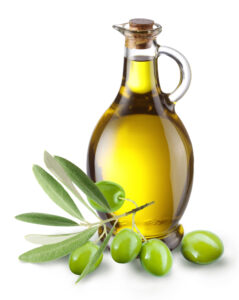What Is The Truth About Olive Oil And You?
Author: Dr. Stephen Chaney
 You may have seen headlines claiming that olive oil doesn’t deserve its “health halo”. It isn’t as healthy as many experts have claimed. It is overrated.
You may have seen headlines claiming that olive oil doesn’t deserve its “health halo”. It isn’t as healthy as many experts have claimed. It is overrated.
These headlines aren’t referring to the scandalous practice of selling “extra virgin” olive oil that contains cheaper oils. That is another topic for another day.
The headlines are claiming that, while the Mediterranean diet is healthy, it is fruits, vegetables, whole grains, legumes, and fish that make the Mediterranean diet healthy. Their claim is that olive oil has little to do with it.
To evaluate these claims I have reviewed the study (AK Krenek et al, Journal of the American Heart Association, Volume 13, Number 15:e035034, July 24, 2024) behind the headlines.
And to provide context, I have also reviewed another recent study (M Guasch-Ferre et al, Journal of the American College of Cardiology, Volume 79, Number 2, 2022).
How Were These Studies Done?
 The two studies were very different:
The two studies were very different:
The First Study used a randomized cross-over design to compare high and low olive oil diets.
In the randomized cross-over design participants were randomly assigned to one of the two diets at the beginning of the study. They followed that diet plan for 4 weeks. And after a one week “washout” they followed the other diet plan for 4 weeks. In this type of study each participant serves as their own control.
Study participants (50 obese participants, average age = 64, 75% women, 72% white, ≥ 5% risk of heart disease) were all eating a typical American diet.
Each of the experimental diets was a whole food plant-based diet, with comparable amounts of fruits, vegetables, whole grains, legumes, nuts, and seeds. Both diets were high in fiber, low in added sugar, and contained less than an ounce of animal products a day. In other words, the base diet was a healthy plant-based diet.
Participants in the high olive oil group were asked to add 4 tablespoons/day of extra virgin olive oil to their diet while participants in the low olive oil group were asked to restrict their olive oil intake to < 1 teaspoon/day.
No effort was made to control portion sizes or caloric intake. As we will see below, this was a major weakness of the study. As you might expect, fat intake was significantly greater for those on the high olive oil diet (49% of calories) compared to the low olive oil diet (32% of calories). Consequently, caloric intake was also significantly greater on the high olive oil diet.
All participants met with a dietitian/chef at the beginning of the study and were given access to online training programs and a dietitian hotline for questions. Dietary intake was measured by a 24-hour dietary recall 4-7 times prior to the study and 4 times during each diet period.
Fasting blood and urine samples were collected prior to the study and at the end of each 4-week diet period to measure biomarkers with possible predictive value for heart disease, such as LDL cholesterol.
The Second Study was a prospective cohort study using data obtained from 60,582 women in the Nurses Health Study and 31,801 men in the Health Professionals Follow-Up Study.
In a prospective cohort study a cohort or group of people (in this case, the 60,582 women and 31,801 men in the two studies) are followed over time (in this case for 28 years from1990 to 2018). The study then measures the association between some aspect of their diet and lifestyle (in this case the kind of fat in their diet) and health outcomes at the end of the study (in this case all-cause mortality, cardiovascular mortality, cancer mortality, neurodegenerative disease mortality, and respiratory disease mortality).
A strength of this study was that the diet of all participants was assessed every 4 years, which allowed the investigators to track changes in their diet over time. The intake of most fats was remarkably stable over the entire 28-year duration of the study.
However, as the bad news about margarine and the good news about olive oil entered the popular media, margarine consumption declined, and olive oil consumption increased. Because the investigators were able to track these changes over time, they were able to correct for them in their data analysis.
Is Olive Oil Overrated?
 Results From The First Study: If we restrict ourselves to statistically significant observations, the results were as follows:
Results From The First Study: If we restrict ourselves to statistically significant observations, the results were as follows:
- Switching from the baseline diet (typical American diet) to either the high olive oil or low olive oil diets for 4 weeks resulted in a significant decrease in total cholesterol, LDL cholesterol, HDL cholesterol, and blood glucose levels.
- In this case, there was no statistically significant difference between the two diets.
However, when transitioning from the low olive oil diet to the high olive oil diet and from the high olive oil diet to the low olive oil diet, some statistically significant differences were observed.
For example, transitioning from the high olive oil diet to the low olive oil diet resulted in:
- A 7% decrease in total cholesterol.
- An 11% decrease in LDL-cholesterol.
- A 2.2% decrease in HDL-cholesterol.
- A 2% decrease in blood glucose levels.
And transitioning from the low olive oil diet to the high olive oil diet resulted in:
- A 14% increase in total cholesterol.
- A 14% increase in LDL-cholesterol.
- A 15% increase in HDL-cholesterol.
- A 17% decrease in blood glucose levels.
The authors of this study said, “Although both [whole food, primarily plant-based] diets improved [risk factors for heart disease], a low olive oil intervention may provide superior LDL-cholesterol lowering in individuals at highest risk [of heart disease]. Future studies are needed to determine if these short-term effects are sustainable and translate to improvements in cardiac outcomes…Nevertheless, a whole food primarily plant-based diet with relatively lower olive oil may be a useful tool for clinicians for improving cardiovascular risk compared with greater olive oil intake.”
The authors also went on to say, “…olive oil may not be the beneficial additive of a Mediterranean diet.”
 Results From The Second Study:
Results From The Second Study:
Higher intake of olive oil (>0.5 tablespoons/day compared to ≤1 teaspoon/day) resulted in:
- A 19% decrease in the risk of all-cause mortality. And when that was broken down by cause it amounted to:
-
- A 19% decrease in the risk of cardiovascular mortality.
-
- A 17% decrease in the risk of cancer mortality.
-
- A 29% decrease in the risk of neurodegenerative disease mortality.
-
- An 18% decrease in the risk of respiratory disease mortality.
In a substitution analysis calculating the effect of consuming 10 g/day of olive oil instead of 10 g/day of:
- Butter resulted in a 14% decrease in the risk of all-cause mortality.
- Margarine or dairy fat resulted in a 13% decrease in the risk of all-cause mortality.
- Mayonnaise resulted in a 9% decrease in the risk of all-cause mortality.
- Other vegetable oils had no effect on all-cause mortality.
- Results were similar when the investigators looked at the effect of replacing fats with olive oil on mortality due to cardiovascular disease, cancer, neurodegenerative disease, and respiratory disease.
The authors of the second study concluded, “Higher olive oil intake was associated with lower risk of total and cause-specific mortality. Replacing margarine, butter, mayonnaise, and dairy fat with olive oil was associated with lower risk of mortality.”
How can we reconcile these conflicting viewpoints? Let me start by looking at the flaws in the first study. Then I will summarize the “truth” about olive oil based on what these two studies tell us.
Is The Study Behind The Headlines Misleading?
 First let me summarize why I consider the study to be misleading. Then I will discuss why the headlines about the study are misleading.
First let me summarize why I consider the study to be misleading. Then I will discuss why the headlines about the study are misleading.
Why The Study Is Misleading: The main conclusion of this study was that adding olive oil to a primarily plant-based diet increased the risk of heart disease. While this study is well-designed in some respects, it is flawed in others. I will summarize the flaws here:
Flaw Number 1: The authors rely on the relative effects of the high and low olive oil diets on LDL-cholesterol levels in predicting the effect of the two diets on heart disease risk. However, there is a major problem with this argument:
- HDL-cholesterol levels move in the same direction. Both are decreased in the transition from the high olive oil to the low olive oil diet. Both are increased in the transition from the low olive oil to high olive oil diet. The ratio of HDL to LDL cholesterol changes very little, so it is almost impossible to predict what effect these changes will have on heart disease outcomes.
Flaw Number 2: This is related to the flaw I mentioned earlier. No effort was made to control portion size or caloric intake of participants on these diets. The high olive oil diet added 4 tablespoons of olive oil to the low olive oil diet. This significantly increased the fat and caloric intake of participants on the high olive oil diet.
- Participants lost weight on both diets, but weight loss was significantly greater on the low olive oil diet. In their discussion, the authors admitted that the greater reduction in LDL-cholesterol on the low olive oil diet could have been due to the greater reduction in weight on that diet.
Flaw Number 3: I call this the “straw man” flaw. By adding 4 tablespoons of olive oil to the high olive oil diet the authors created the equivalent of a straw man that was easy knock over. Even if their conclusions were correct, nobody has recommended the addition of 4 tablespoons of olive oil to any diet as a heart-healthy approach.
Mediterraneans don’t add 4 tablespoons of olive oil to their diet. Olive oil is part of the foods they eat and the way they prepare their food.
 Why The Headlines Are Misleading: Of course, the headlines were misleading because they ignored the many flaws of the study.
Why The Headlines Are Misleading: Of course, the headlines were misleading because they ignored the many flaws of the study.
However, I find it amusing that some of the headlines came from “Forks Over Knives” an organization that advocates for a very low-fat plant-based diet. They were using this study to question the value of olive oil as part of a whole-food plant-based diet.
However, when you look at the study, 32% of calories came from fat in the low olive oil diet, and 49% of calories came from fat in the high olive oil diet.
For perspective:
- The low-fat whole-food plant-based diet recommended by “Forks Over Knives” has <10-15% of calories from fat.
- The Mediterranean diet typically contains 35-40% of calories from fat.
-
- Around 18-19% of that is monounsaturated fat.
-
- Around 8% of that is saturated fat.
- The typical American diet also contains 35-40% of calories from fat.
-
- Around 12-14% of that is monounsaturated fat.
-
- Around 12% of that is saturated fat.
In other words, the low olive oil diet in this study resembles the fat content of the Mediterranean and typical American diets, not the low-fat whole food plant-based diet recommended by “Forks Over Knives”.
And the high olive oil diet contains fat levels not seen in any natural diet. Except for a few keto enthusiasts, I don’t know of any experts who think getting almost 50% of your calories from any kind of fat is a good thing.
What Is The Truth About Olive Oil And You?
 As described above, the study behind the headlines is a very small, very short study with multiple flaws. So, you can ignore headlines like “Olive oil is overrated” or “Olive oil doesn’t deserve its health halo.”
As described above, the study behind the headlines is a very small, very short study with multiple flaws. So, you can ignore headlines like “Olive oil is overrated” or “Olive oil doesn’t deserve its health halo.”
The second study I discussed is much larger (92,383 participants) and of much longer duration (28 years). More importantly, it measures health outcomes, not blood biomarkers that might predict health outcomes.
Finally, the second study was not measuring the health benefits of the Mediterranean diet, as many other studies have done. It was looking at the effect of varying olive oil intakes in the American diet. The high olive oil intakes in this study were less than those seen in the Mediterranean diet. This is good news for the average American who may feel overwhelmed trying to adopt to a Mediterranean diet.
This study reinforces previous studies showing that olive oil is healthy. But let me put this into context.
- Olive oil is not a superfood. This study showed that it is no healthier than other plant oils. It is, however, considered one of the best vegetable oils for sauteing. It is also less susceptible to oxidation than seed oils, although I still recommend you store it in the refrigerator.
- It is not something you add to your diet. It is something you incorporate into your diet. People who live in Mediterranean regions:
-
- Cook with olive oil.
-
- Use olive oil in their salad dressings and drizzle a little olive oil on cooked vegetable and pasta dishes instead of adding butter.
-
- Dip their bread in olive oil rather than using butter or mayonnaise.
-
- Use it in spreads like tapenade or hummus.
-
- Use olives in cooking.
- Finally, look for extra virgin olive oil. That doesn’t mean you need to spend “an arm and a leg”. But I would do a little online research before I bought the cheapest brand at the discount store.
The Bottom Line
You may have seen recent headlines claiming that olive oil is overrated and that it doesn’t deserve its “health halo”. So, I looked at the study behind the headlines.
It was a very small, very short study with multiple flaws. You can forget the headlines.
For context I also reviewed another recent study. It was a much larger (92,383 participants) and longer duration (28 years) study. More importantly, it measured actual health outcomes, not just blood biomarkers that might predict health outcomes.
It concluded that olive oil is good for us. It is healthier than most fats commonly found in the American diet, but it is no healthier than other plant oils.
For more details on these studies, what they mean for you, and how to incorporate more olive oil into your diet read the article above.
These statements have not been evaluated by the Food and Drug Administration. This information is not intended to diagnose, treat, cure or prevent any disease.
______________________________________________________________________________
My posts and “Health Tips From the Professor” articles carefully avoid claims about any brand of supplement or manufacturer of supplements. However, I am often asked by representatives of supplement companies if they can share them with their customers.
My answer is, “Yes, as long as you share only the article without any additions or alterations. In particular, you should avoid adding any mention of your company or your company’s products. If you were to do that, you could be making what the FTC and FDA consider a “misleading health claim” that could result in legal action against you and the company you represent.
For more detail about FTC regulations for health claims, see this link.
https://www.ftc.gov/business-guidance/resources/health-products-compliance-guidance
_____________________________________________________________________
About The Author
Dr. Chaney has a BS in Chemistry from Duke University and a PhD in Biochemistry from UCLA. He is Professor Emeritus from the University of North Carolina where he taught biochemistry and nutrition to medical and dental students for 40 years.
Dr. Chaney won numerous teaching awards at UNC, including the Academy of Educators “Excellence in Teaching Lifetime Achievement Award”.
Dr Chaney also ran an active cancer research program at UNC and published over 100 scientific articles and reviews in peer-reviewed scientific journals. In addition, he authored two chapters on nutrition in one of the leading biochemistry text books for medical students.
Since retiring from the University of North Carolina, he has been writing a weekly health blog called “Health Tips From the Professor”. He has also written two best-selling books, “Slaying the Food Myths” and “Slaying the Supplement Myths”. And most recently he has created an online lifestyle change course, “Create Your Personal Health Zone”. For more information visit https://chaneyhealth.com.
For the past 45 years Dr. Chaney and his wife Suzanne have been helping people improve their health holistically through a combination of good diet, exercise, weight control and appropriate supplementation.
